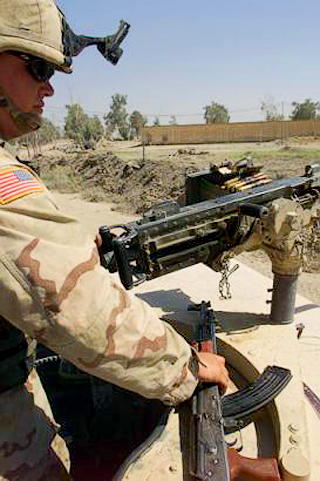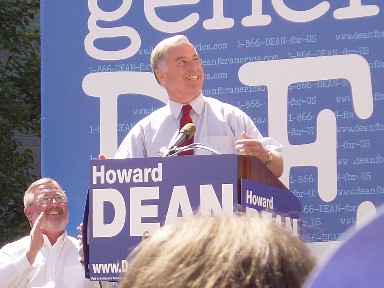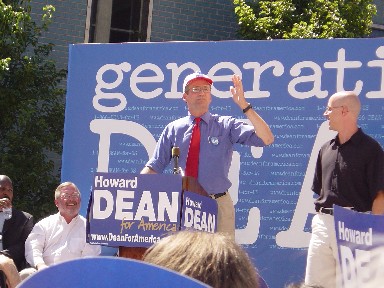Why do I say Irving Kristol had better keep a close eye on his allies on the “official” right? Simply this: He recently wrote a piece for The Weekly Standard in which he spelled out exactly what neoconservatism is. What’s worse is that ol’ Irv’s description of neoconservatism proves that it is everything its critics have said it is—and worse.
Michael Tennant, conservative columnist, has written another of what may be very many angray deitorial responses to Irving Kristol's recent public neocon "
coming out."
Finally, in case any doubt remains as to whether the Bush administration qualifies as neoconservative—and there are still some out there who believe it remains fully within the American conservative tradition—Kristol puts all doubt to rest. Bush and his administration, he says, “turn out to be quite at home in this new political environment, although it is clear they did not anticipate this role any more than their party as a whole did.” Face it, says Kristol: We’ve won, and you traditional conservatives in the Republican Party never saw it coming and still don’t know what hit you. Unfortunately, he’s right.
It would be dishonest and pointless for me to pretend to share in the indignation that is sweeping through conservative principles. Much of Tennant's shock about Neoconservatism is directed at the components of the philosophy that I find least troubling, like their embrace of FDR and the New Deal. That aside, it is rather heartening to see people of any political stripe interested in honest inquiry into what the neocons are doing to the most basic aspects of how we conduct ourselves as a nation.
Not only are conservatives--like Tennant, presumably, but more importantly John McCain and Ron Paul--welcome allies in the fight against sweeping (big-N) Nationalist dogma, but they may be luminary precursors of a new political identity forged of response to the PATRIOT Act, unilateralism abroad, and rampant and dishonest fiscal policy.
I really don't want to toot my own horn here--especially because I've noticed a few new readers recently, and I want them wait a while before they figure out that I'm a total blowhard--but this editorial, along with the
Justin Raimondo piece from a couple days ago, seem to me to herald the emergence of a political split about which I have been bellyaching for months. The standard-bear left/right axis can easilly be shelved when people find more salient common ground in more abstract arenas: protection of civil liberties and the Bill of Rights, transparency and honesty in politics, the social and "moral" consderations which drive foreign policy.
If this is true, if defense of civil liberties really is more important than one's proclivity to endorse high taxes or macrosocial reproductive decisions, then I think the Democrats would be unwise to look at it as simply a division on the right that can be exploited for short-term advantage. After all, the primary singificance of the "neoconservative awakening" is really just that Republicans are realizing now what Democrats have known for years: that they are painfully underserved by their party appratus. The Dems would be better-served to get behind the surhing outrage, rather than trying to harness it into a sort of binary I-told-you-so-ism. Because they didn't tell us so. They voted for the PATRIOT Act and the war in Iraq the same as did Republicans.
off the deep end I go:
Here's how the Democrats shoul deal with this. First, they need to keep acknowledging the need for real change. Polls make it pretty clear that Dean now has the nomination in his pocket, and this weekend's upcoming publicity stunt won't hurt matters, either. Dean is all about populism and change. But the real radical departure should come with the selection of Dean's running mate: John McCain. McCain would do as good a job of patching the "national security hole" in Dean's resume as any Dem, and politically he would help Dean to attract centrist libertarian types, who really ought to be a voting block that he shoots for. But more importantly, he is an anti-Republican in the same way that Dean is an anti-Democrat.
Just something to think about, and I know it will never happen, but wouldn't it be a freaking coup if the man that is written off by the press as being too far to the left picked a Republican running mate?






